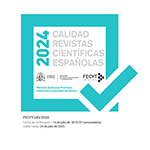The risk of professionalization of social work in Spain
Abstract
This article relates de-professionalization theory to the current state of social work in Spain. De-professionalization refers to the process of erosion of the monopoly on knowledge as a consequence of loss of professional autonomy and authority. The conceptual elements of this theory are applied to social work and five factors that impact on the de-professionalization process are studied: a) the policy of precariousness in the provision of social services; b) the increasing precariousness of the job market; c) the bureaucratization of the professional field and activity; d) the codification and standardization of intervention; and e) fragmentation of the knowledge process. Bases are established to comprehend the risks that social work faces as a profession, and professional autonomy is emphasized from the perspective of ethics and reinforcement of scientific foundations.Downloads
Article download
License
In order to support the global exchange of knowledge, the journal Cuadernos de Trabajo Social is allowing unrestricted access to its content as from its publication in this electronic edition, and as such it is an open-access journal. The originals published in this journal are the property of the Complutense University of Madrid and any reproduction thereof in full or in part must cite the source. All content is distributed under a Creative Commons Attribution 4.0 use and distribution licence (CC BY 4.0). This circumstance must be expressly stated in these terms where necessary. You can view the summary and the complete legal text of the licence.









